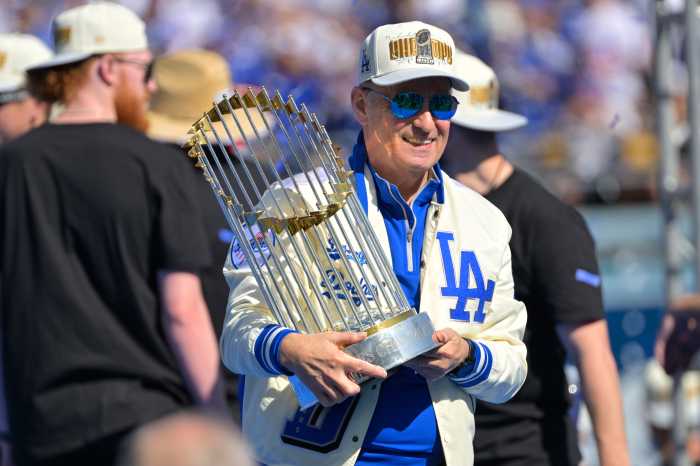
In this story:
Los Angeles Dodgers two-way phenom Shohei Ohtani turned heads Friday with an opposite-field home run in his spring training debut.
In a few days, we’ll see what teammate Roki Sasaki has planned for an encore.
Dodgers manager Dave Roberts announced that Sasaki will make his Cactus League debut Thursday night against the Cincinnati Reds. However, the 23-year-old righty won’t start; instead, he’ll follow Yoshinobu Yamamoto, who is expected to pitch roughly four innings.
Roberts said he wants Sasaki to pitch at least three innings.
Yamamoto and Sasaki are expected to start the Dodgers’ first two games in Tokyo later this month. Barring injury or an unexpected rotation change, Sasaki will make his MLB debut against the Chicago Cubs on his home soil.
“I think that this is kind of where we expected him to be,” Roberts recently told reporters, according to the Dodgers’ official website.
Sasaki is arguably baseball’s most hyped prospect after a stellar career with the Japan Pacific League’s Chiba Lotte Marines. The two-time All-Star went 29-15 with a 2.10 ERA and 505 strikeouts in 394 2/3 innings.
“[In] his words, he’s not a finished product,” Roberts said earlier this week. “We feel the same way. … Just seeing how his pitch mix plays against Major League hitters, that’s going to keep adding confidence for him.”
Dodgers Are Not Ruining Baseball—They’re Playing Smart
However, the Dodgers are not ruining baseball; they are simply operating within the rules and maximizing their resources as any well-run organization should.
The Dodgers have taken advantage of MLB’s allowance for deferred payments to keep their present-day payroll lower while investing heavily in top-tier talent.
Shohei Ohtani’s record-breaking $700 million contract, with $680 million deferred, is a prime example of this strategy.
The team has committed over $1 billion in deferred money, spreading payments over decades to balance their financial obligations.
Critics argue that this gives them an unfair competitive edge, but the truth is that every team in the league has the option to utilize deferred payments—most simply choose not to.
Deferred contracts do not eliminate financial responsibility; they delay it. The money will still be paid, and the team must plan for those obligations.
Unlike past cases, such as the Arizona Diamondbacks’ struggles with deferred payments in the early 2000s, MLB now requires teams to have funds set aside for deferred salaries, ensuring long-term stability.
Another common complaint is that the Dodgers’ spending power makes it impossible for smaller-market teams to compete. While it is true that Los Angeles has the financial resources to field a high-payroll team, money alone does not guarantee success.

Los Angeles Dodgers owner Stan Kasten holds the World Series championship trophy at Dodger Stadium.
Jayne Kamin-Oncea-Imagn Images
Just look at the New York Mets, who spent over $350 million in 2023 only to miss the playoffs. Meanwhile, teams like the Tampa Bay Rays and Baltimore Orioles have remained competitive with significantly smaller payrolls.
MLB has mechanisms to support competitive balance, including revenue sharing and the competitive balance tax. Despite their deferred salary strategy, the Dodgers still pay luxury tax penalties, contributing more than any other team to the league’s financial ecosystem.
The Dodgers’ financial dominance is not a problem—it’s a benefit. Their aggressive spending generates excitement, increases media attention, and boosts TV ratings.
The 2024 Yankees-Dodgers World Series saw a 67% ratings jump compared to the previous year, proving that marquee teams and big spending create more interest in the sport.
Instead of blaming the Dodgers, other teams should follow their example. Investing in top-tier talent, leveraging creative financial strategies, and prioritizing on-field success should be all franchises’ goals.
The real issue is not the Dodgers’ spending—too many teams refuse to do the same.
Leave a Reply